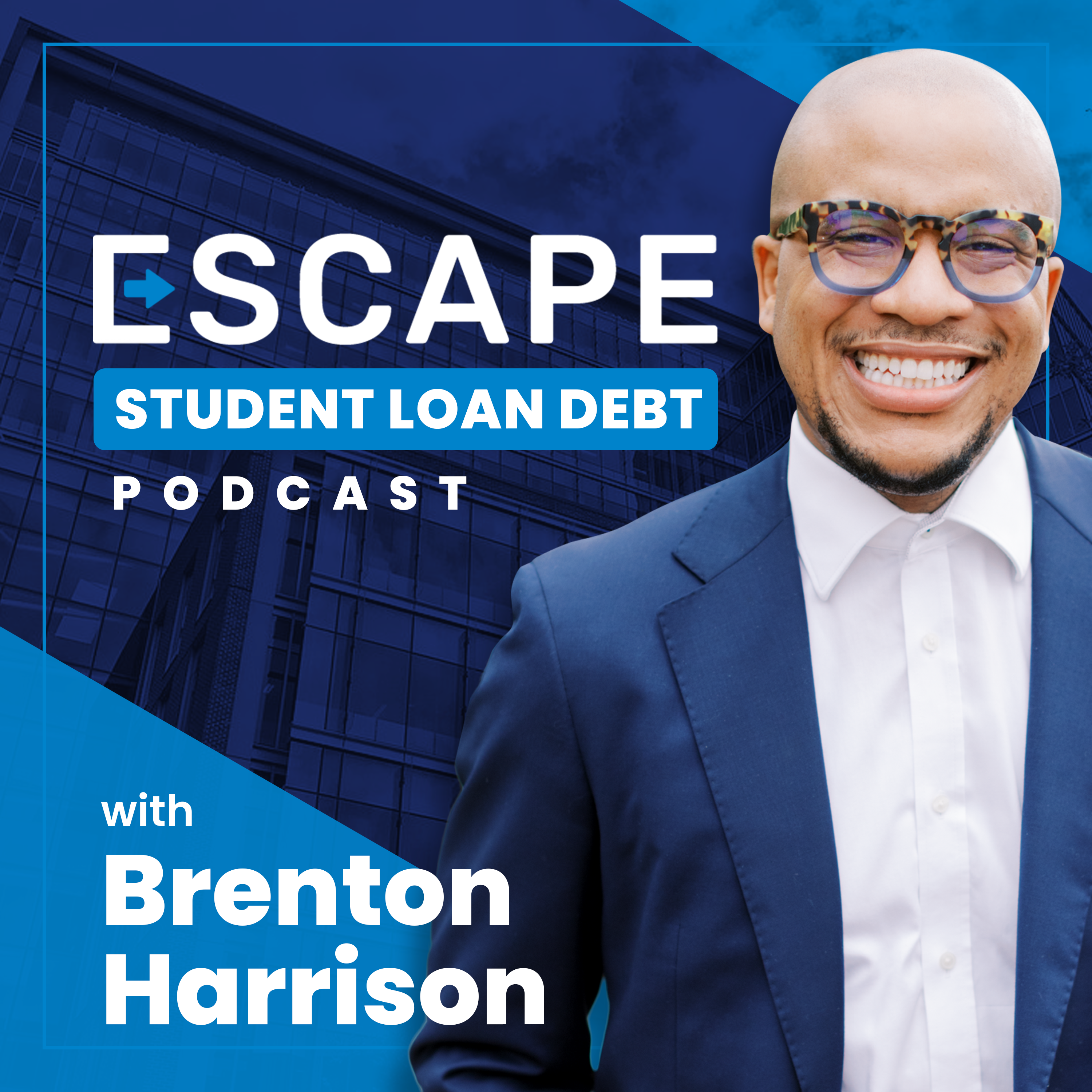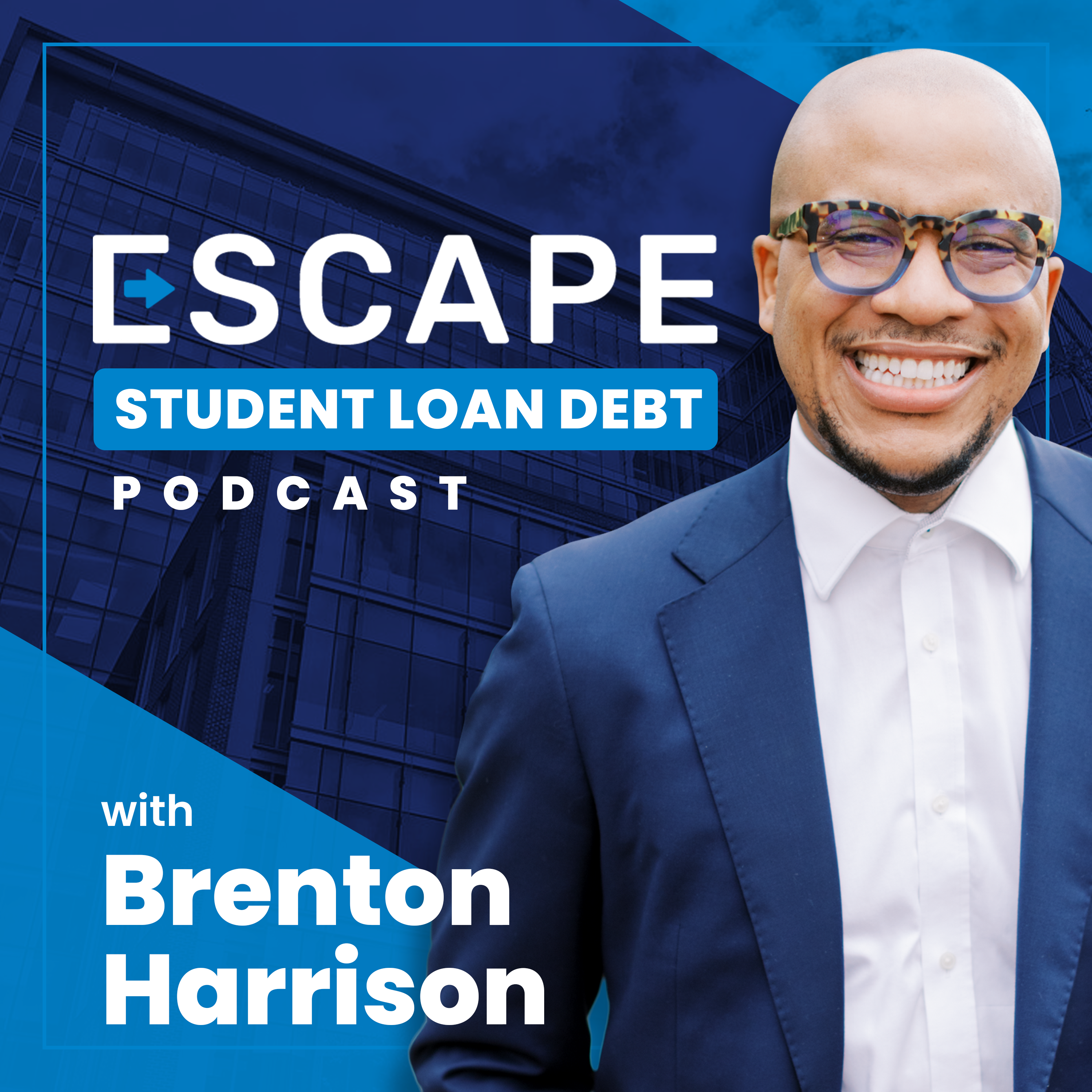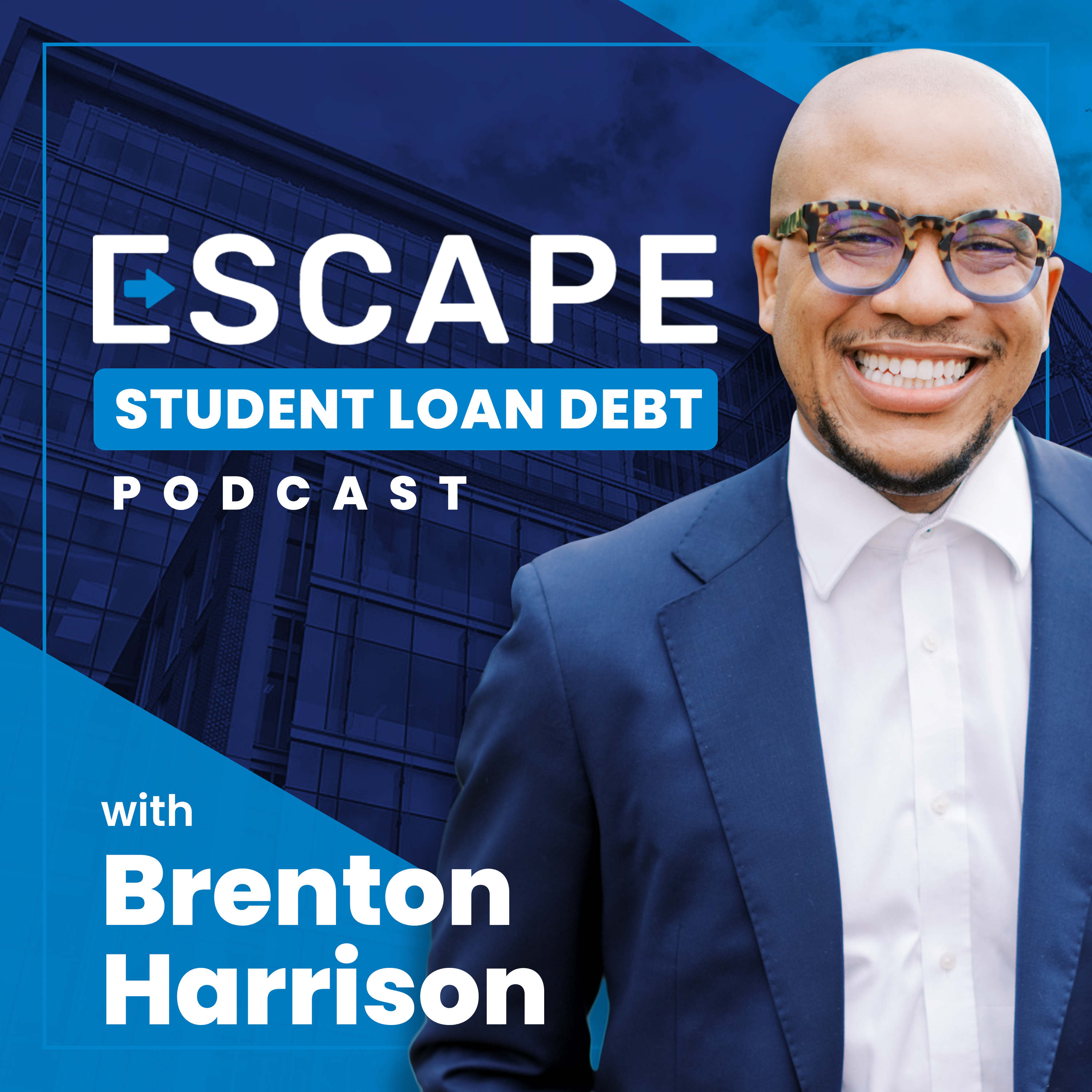Episode Transcript
Brenton: [00:00:00] As federal student Loan payments are about to restart. Many borrowers out there are wondering if they should stick with the federal government, or if now is the time to consider refinancing with a private student lender. In this episode, we tell you all about how private student loans work, and we start to build the case of whether it is or is not the right thing for your student loans.
Let's get started.
Brenton: Hello, this is Brenton Harrison of Escape Student Loan Debt and your host for the Escape Student Loan Debt podcast. I hope you guys are enjoying the end of the summer. It is absolutely blazing hot where I am, uh, but still enjoying the last couple of weeks.
As we get a little closer to the time when student Loan payments restart again, a lot of people are looking around the corner for the first time in a few years at private student loans, wondering if it's a potential option for their [00:01:00] loans, and there are some people who just for various reasons, have to take out private student loans for their schooling on the front end.
In this episode, we're not really gonna get into as much about when you should or should not refinance as we are about the structure of private student loans as it compares to federal student Debt so you can have an idea of how they contrast when making your decision.
So the majority of this episode will give you the context and the structure of what it would look like if you refinanced a federal student Loan with a private lender. Let's first start with the interest rate that you might receive. The interest rate that you see on federal student loans is based on the number of factors. The baseline rate that they're using on the lower end for some of their high credit, dependable income borrowers has a lot to do with a rate called the secured overnight financing rate. There used to be this interest rate benchmark called the L I B O R, the London Interbank Offertory Rate, and that rate as it changed, and it changed frequently, would [00:02:00] be what private student Loan lenders would use to say, Hey, if the L I B O R rate is at five, then we're gonna offer our lowest interest rate at 5.5% to our borrowers. Now that L I B O R has been taken out of the equation for most private student lenders and they now use the S O F R, the secured overnight financing rate, and that has a lot to do on a weekly or quarterly basis on how they set their rates for their new borrowers. But once you get beyond that baseline rate, the rate that you receive has to do with a number of factors. The obvious one will be your credit. If you don't have strong credit, you can't expect to have the best interest rate that a bank would offer or a lender would offer. But the better your score gets, the better that interest rate could become.
But in addition to those things, you also see factors at play with private student loans, like the stability of your income. All income isn't created equal when you're applying for private student loans.
If you have someone in sales who does well for themselves, happens to Earn a hundred thousand dollars a [00:03:00] year, but that's an average. Maybe one year they're earning $125,000. The next year they might Earn 75. That's not going to look as strong in an application for a private student loan as a person in a really dependable industry that has consistent income year over year, maybe a college professor might get a better interest rate than you would see for the sales person, even though their income is the same and they might owe the same amount of Debt.
And with some private student lenders, you even see some factors that come into play, like the stability of the major that you had in school and the school where you obtained your degree.
For example, if you had someone who had a very general degree in the humanities from a state school, they might find that they don't get offered as good of an interest rate as someone who has a degree in the sciences from Harvard. So when you have a private lender who has experience with multiple borrowers from a school, they will actually ask you as a part of the application process from where you got your degree, and it can play a role.
Now the thing is that for most people, no matter [00:04:00] where you got your degree, no matter how stable your income is early in your career, if you're a younger borrower who's trying to get a private student Loan, in many cases, unless you're just earning crazy money, a private student Loan lender is going to want you to have a co-signer.
Now a co-signer is a person who's signing up for an equal responsibility to pay back your student loans, whether or not the Loan was for their schooling. And it's incredibly important that you understand that equal opportunity. 'cause if you decide to be a co-signer for someone else's student Loan, you're basically saying that if they miss a payment, it's going to impact your credit just as much as it will impact theirs.
Now most lenders are going to want someone who co-signs on a student Loan to have better finances or a better credit score than the actual borrower. So you often see a student who might ask their parent to co-sign on a student Loan, or an older sibling or a friend of theirs who's more established, and that person may just sign off on it, not thinking and just say, Hey, I'm helping out my friend or my daughter, or [00:05:00] what have you, not understanding that if anything comes up and the actual borrower is unable to pay the Debt, it's now their responsibility. I've seen horror stories of people who have co-signed on the Debt and the person who was the actual borrower experienced an injury or an illness and is unable to work for a period of time.
During that period, the co-signer has to cover those payments because if not, their credit's going to be on the line as well. I've seen situations where people have co-signed for friends and then fallen out of favor with those friends, and the friend just stops paying it knowing that, hey, the other co-signer is going to have to, because they don't want to screw up their finances.
I've seen divorces where it hasn't been taken care of in the divorce, figuring out who actually owes that Debt and as a result, seeing former spouses having to pay the Debt of their ex-husband or ex-wife because of co-signed situations that have not been properly maintained.
So I would say that if you can avoid co-signing for someone's student Loan Debt in any form of fashion, I [00:06:00] would. But if you can't avoid it, it's something that you should only do in the most extreme of situations.
Now, once they've gone through all those factors, it's time to actually look at the structure of the interest rate for your Loan to determine what the final interest rate will be. And that means that you have to decide whether you want a fixed rate Loan, or a variable rate option.
A fixed rate option is exactly like what it sounds, the rate is fixed. If you get a 6% fixed rate student Loan, then you're going to pay 6% on that Debt for the entirety of your Repayment period. A variable rate private Loan works differently.
Instead of having a fixed rate, it has a range of interest rates where it has a minimum rate of say 4%, and maybe it has a maximum rate of say 8%. And when you compare the two, the lowest rates that you'll find on a variable rate Loan are often below that of a fixed rate loan. So if you have a variable rate that's offering 4% for their minimum rate, it's probably because fixed rates may be around five or 6%.[00:07:00]
So what some borrowers do is they say, I'm going to take out this variable rate Loan while the rate is lower than the fixed rate. I'm gonna take advantage of that interest savings and if later down the line that interest rate on my variable rate increases beyond what I can find with the fixed rate, I'll just refinance it and I'll switch to a fixed rate Loan.
Now we'll talk about the viability of that option over the next several episodes, but that is The calculus. I'm gonna take this variable rate Loan, because right now the interest rate is lower than the fixed rate. But again, it's variable. And depending on that lender, they may be able to change the interest rate on that Loan as frequently as monthly.
Some do it quarterly, some may do it semi-annually, and they often look at that secured overnight financing rate. And as it increases, those variable rate loans increase as well throughout the Repayment period.
And I can say that in my experience, I found it very rare to be worth the potential risk of having that interest rate increase to take [00:08:00] advantage of a temporary interest savings on a variable rate Loan. But again, this is something that people do.
So now that you know the structure of your student Loan is gonna be fixed or variable, we can now get to the payment plan options that you have at your disposal. So after the break, we'll not only talk about the payment plans that you have options for, but also some of the key differences between private and federal student loans for these prospective borrowers.
[00:09:00]
Brenton: All right. Let's get to payment plans. You know, if you follow this podcast that when it comes to federal student loans, we talk a lot about the options that are available with Income, Driven, Repayment plans. They are one of the most flexible forms of Repayment that you'll find with debts out there, even though they're as confusing as you can possibly find.
But when you talk about private student loans, none of that is available. There are no Income Driven, Repayment plans for private student loans. The reason is for federal student loans, there are forgiveness options, and those forgiveness options are time based For an Income Driven Repayment plan, if you pay for a certain period of time and a certain percentage of your income, any remaining balances are [00:10:00] forgiven. With private student loans, this is not the federal government. They're not in the business of forgiving Debt, so you have to pay your Debt off in full. So when it comes to payment plans, the only option is not percentage of income based. It's all time based. You have payment plans that might be a five year payment, a seven year payment.
10, 15, 20 years is about the limit of what you'll see with a private student Loan lender.
So when you compare the flexibility of manipulating your payment under Income Driven Repayment plans where you can have payments as low as $0 based on your income, that can still count. You can manipulate the size of your family, when it comes to Married Filing Separately, you can do all types of things to lower your payment if needed, or take a pause.
Those are not the same options that you have with these fixed period loans. It's either I'm gonna get a 20 year plan because that has the lowest payment of the options available. I'm gonna a 15 year plan, a 10 year plan, a seven year plan if I'm gonna get more aggressive.
But to me, one of the things [00:11:00] that makes it so crucially important that you know, that you know, that you know that it makes sense to refinance with a private lender is because once you're over there, the options to change or stop your payment are greatly reduced as compared to federal student loans.
Now let's talk about deferment and forbearance. For federal student loans. There are a number of things and periods that you can use at your disposal when it comes to putting your loans in deferment: military deferment in school, deferment and the like. For forbearance, most of them are income based. If you're experiencing a rough goal of it and you need to put a pause on your payments, you can do forbearance for up to 12 months consecutively, 36 months cumulatively over the course of your Repayment period. That's for federal loans. For private student loans, it's a little different. There are periods of deferment, like in-school deferment and military deferment. But for forbearance, the amount of time that you can spend in that status is greatly reduced.
For most private student lenders, they'll allow you to be in [00:12:00] forbearance for up to three months consecutively and 12 months over the entirety of your Repayment period. So literally a third of the time. Which means, again, that you have to be sure that you're sure because if you experience a period of rough earnings or increased expenses, it is not as easy to run to a private student lender and say, Hey, I need a few months off.
Now let's talk about defaulted payments. We covered in the episode about the Fresh Start program for defaulted federal student loans that the consequences of a defaulted federal Debt are really, really severe. They can take your tax refunds, they can garnish your wages.
In some states, they can prevent you from working. If you have a professional license, it can even be suspended and they can pursue you for as long as you don't repay them. There is no statute of limitations at which point the department just has to say, oh, whatever, we can't pursue them any further. With private student loans, it's a little different.
With private student loans, when you fall into default or whatever their version of it is, there is a statute of limitations [00:13:00] beyond which point that lender cannot pursue you for Repayment. And the length of time for that statute of limitations varies from state to state.
So you've had some extreme situations where there's people who are like, I'm in my sixth year of not paying these people, and based on the state in which I took out the Debt seven years is the statute of limitations.
It might make more sense for me to just not pay it for that extra year. And after that period, My credit is destroyed, I can't really go get another Loan, but at least this lender can't come after me. Now I can tell you that is the worst possible way to deal with a private student Debt, but it is something that is a little bit different as compared to what you see with federal student loans.
So structurally those are some of the key differences that you see between these two types of Debt private student loans versus federal student loans. As I said, a lot of this is in the context of a person who'd be trying to refinance with a private student Loan. And in the next episode that we cover this category, which may be the next episode, maybe we skip one, we'll actually start to [00:14:00] go through the process of determining if it is worth making the switch and what some of those factors are that go into your decision. I'll see you then.


